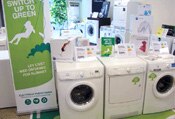Electrolux takes an active lifecycle interest in consumer safety and quality assurance relating to its appliances. Safety and quality are included in procedures for evaluating suppliers, designing products, selecting materials, testing finished appliances and monitoring product performance. A process is underway to ensure that these procedures are harmonized across the Group.
Consumer health and safety
In order to qualify for use, products and components sourced from external suppliers are subject to an assessment procedure including safety and quality elements.
Before a product designed by Electrolux goes into production it is subject to a number of tests and quality assurance activities. It is tested throughout production to ensure that it complies with safety and quality criteria.
The Group has a system for collecting information on safety-related incidents and analyzing them to identify root causes and effects. These analyses have provided the Group with an understanding of how accidents occur. The expertise is integrated into product development.
The responsibility for product safety rests with the respective sector. To ensure that all major issues are reported to Group management, each sector must have a Sector Product Safety Advisory Committee (SPSAC). All SPSACs must regularly report their sector’s product safety status to the Group Product Safety Advisory Committee (GPSAC).
Research undertaken by Electrolux reveals that, with few exceptions, these incidents represent no risk to the consumer.
Product and service labeling
By using labeling and supplying user manuals, Electrolux provides customers with sustainability information and fulfills legal requirements regarding customer safety.
Globally, Electrolux conducts approximately 80,000 to 90,000 systematic consumer interactions every year to find out more about customer preferences. The Group uses methods ranging from ethnographies and contextual observation to quantitative discrete choice surveys.
Electrolux does not have a direct sales relationship with the end-user and CRM databases are built using warranty card information. One of the cornerstones of the Electrolux strategy is the global needs management process, as well as the product development approach.
The Electrolux Customer Care Manifesto is designed to ensure that customers can find answers to any questions easily and that any problems they face are solved quickly and effectively.
The Group’s customer service quality standards documentation is updated regularly and is backed up by customer service quality management workshops at regional, national and corporate level.
Customers’ product experience is followed up through the Electrolux Quality Evaluation System. Knowledge gained is fed back into design and production processes.
Encompassing all sectors and all regions within the Group, the Global Customer Care Program, launched in 2011, is a major change program to improve how Electrolux cares for its customers. A system to monitor the customer-care experience and measure improvements was developed and, starting in 2011, consumers in Europe are surveyed after a completed service experience using the Net Promoter Score (NPS) scale. The rollout of this system will continue during 2012 and as further knowledge is gained, clear objectives will be put in place.
Marketing communications
Electrolux produces guidelines, shared across Business Sectors, on how the environmental attributes of appliances should be communicated. These guidelines are designed to ensure that environmental claims about Electrolux products are factual, balanced and substantiated.
Compliance with laws on the use of products
Potential non-compliance, disputes or items that pose a material financial risk are reported to Group level in accordance with Group policy. No significant fines were reported in 2011.

